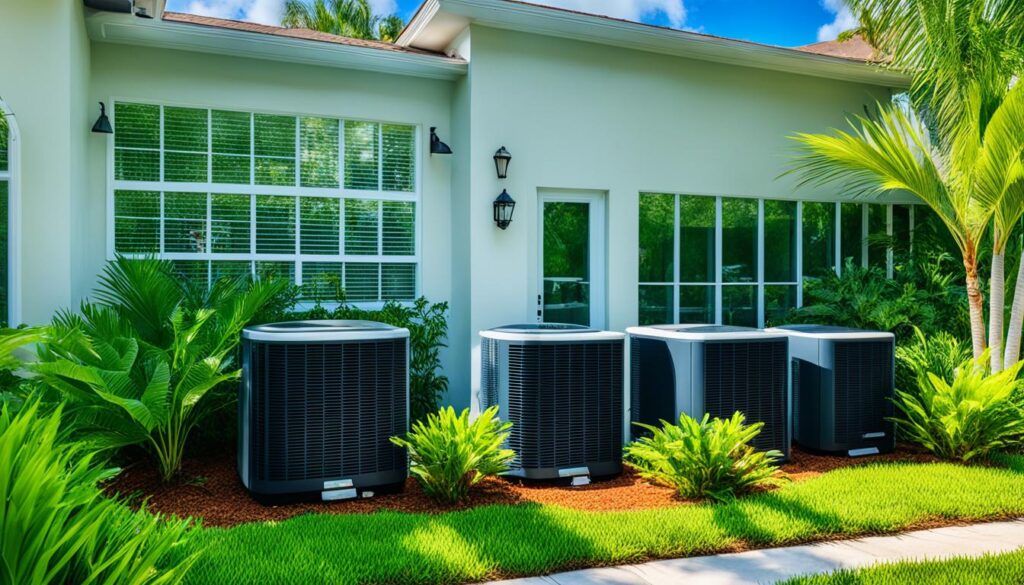
Florida Mold and Allergy Connection Explored
Florida is known for its warm and humid climate, which creates the perfect breeding ground for mold. Unfortunately, this also means that Florida residents are more susceptible to mold allergies and their associated health impacts. In this article, we will explore the connection between mold and allergies in Florida residents and discuss the impact of Florida mold spores on health.
Key Takeaways:
- Florida’s warm and humid climate makes it prone to mold growth, increasing the risk of mold allergies in residents.
- Mold exposure can trigger respiratory issues and allergic reactions in individuals sensitive to mold.
- Prevention methods, such as keeping indoor spaces dry and well-ventilated, can help reduce the risk of mold-related allergies in Florida.
- Addressing mold-related health concerns is essential for maintaining the well-being of Florida residents.
- By taking appropriate measures, individuals can mitigate the impact of mold spores on their health and minimize the risk of mold-induced allergies.
Understanding Mold Allergies in Florida
When it comes to mold exposure and respiratory issues, Florida residents are particularly susceptible to allergic reactions. Mold sensitivity is prevalent among the population, leading to various symptoms that individuals may experience. It is crucial to understand the specific ways in which mold exposure can trigger respiratory issues and allergic reactions in Florida. By doing so, residents can take appropriate measures to mitigate the risks and protect their health.
Mold Exposure and Respiratory Issues
Mold exposure in Florida can have significant respiratory implications, especially for those who are allergic or sensitive to mold. Inhalation of mold spores can irritate the airways and trigger respiratory symptoms such as coughing, wheezing, and shortness of breath. Individuals with existing respiratory conditions, such as asthma or chronic obstructive pulmonary disease (COPD), may experience exacerbated symptoms when exposed to mold.
Allergic Reactions in Florida Residents
Florida’s warm and humid climate creates an ideal environment for mold growth. As a result, many residents develop allergic reactions when exposed to mold spores. Common symptoms of mold allergies include nasal congestion, sneezing, itchy or watery eyes, and skin rashes. These allergic reactions can significantly impact the quality of life and overall health of individuals living in Florida.
Mold Sensitivity in the Florida Population
The Florida population exhibits a higher prevalence of mold sensitivity compared to other regions. This increased sensitivity is due to the abundance of mold spores present in the environment, particularly in areas with poor ventilation or water damage. Individuals with mold sensitivity may experience more severe allergic reactions and respiratory symptoms when exposed to mold.
“Mold allergies can be particularly problematic in Florida due to the state’s humid climate and the presence of moisture-prone environments. It is crucial for residents to be aware of the symptoms and take necessary precautions to minimize their exposure to mold spores.” – Dr. Sarah Johnson, Allergist

Health Concerns and Prevention Methods
When it comes to mold-induced allergies, Florida residents face unique health concerns. The warm and humid climate in Florida creates an ideal environment for mold growth, making it more prevalent in homes and buildings. This, in turn, increases the risk of mold-related health issues.
Mold-induced allergies can cause a range of symptoms, including sneezing, coughing, itchy eyes, and respiratory problems. For individuals already prone to allergies or with compromised immune systems, exposure to mold can exacerbate these symptoms and lead to more severe health issues.
To prevent mold-induced allergies and protect your health, there are several key prevention methods you can implement:
- Keep humidity levels in check: Maintain indoor humidity below 50% to discourage mold growth. Use dehumidifiers if necessary and ensure proper ventilation in areas prone to moisture, such as bathrooms and kitchens.
- Regularly inspect and address water leaks: Water leaks can create a favorable environment for mold growth. Regularly inspect your home for any signs of water damage and address leaks promptly.
- Properly ventilate your home: Good airflow helps prevent moisture buildup and reduces the risk of mold growth. Use exhaust fans in bathrooms and kitchens and open windows when weather permits.
- Use mold-resistant materials: When remodeling or renovating your home, consider using mold-resistant materials such as drywall and paint.
- Keep your home clean and dry: Regularly clean and dry areas prone to moisture, such as shower curtains, bathroom tiles, and window sills. Remove any visible mold immediately using appropriate cleaning methods.
By implementing these prevention methods, you can significantly reduce the risk of mold-related allergies in Florida. Additionally, it’s important to stay proactive and seek professional help if you suspect a mold problem in your home. Professional mold remediation services can address existing mold issues and ensure a safe, mold-free environment.

Remember, prevention is key when it comes to mold-induced allergies in Florida. Take the necessary steps to safeguard your health and create a mold-free living environment.
Conclusion
In conclusion, the link between mold exposure and respiratory issues in Florida residents is undeniable. The prevalence of mold allergies in Florida and the impact of mold spores on health cannot be ignored. It is crucial for individuals to understand the potential health concerns associated with mold-induced allergies and take appropriate measures to prevent and address them.
Florida, with its warm and humid climate, provides the perfect environment for mold growth. Mold sensitivity is common among the population, and exposure to mold spores can trigger respiratory issues and allergic reactions. Symptoms may range from mild to severe, including coughing, wheezing, nasal congestion, and skin rashes.
To protect themselves from the harmful effects of mold, Florida residents should prioritize prevention methods. This includes maintaining proper ventilation in homes, promptly fixing any water leaks or moisture issues, and regularly cleaning and inspecting areas susceptible to mold growth. By taking these proactive steps, individuals can reduce the risk of mold-induced allergies and safeguard their respiratory health.
Overall, it is crucial to acknowledge the impact of mold on respiratory health and to address mold-related health concerns in Florida. By staying informed, implementing preventive measures, and seeking professional assistance when needed, residents can minimize the adverse effects of mold exposure and maintain a healthier living environment.




